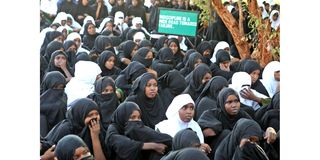Why education remains a tall order for Mandera girls

Students of Moi Girls High School, Mandera, in this picture taken in March.
What you need to know:
- The county has many girls’ schools but enrolment and performance remains dismal.
- Many girls and women spend days herding livestock and fetching water, while boys attend school as men handle other less tiring tasks.
- It takes a father’s commitment for girls to realise their academic dream.
Most stories from Kenya’s northern frontier are a variation of three stereotypical things; hunger, clashes or insecurity and disease.
And women and girls from pastoralist communities, especially Mandera County, face a grim future living in poverty, unless laws are enacted to accelerate their ascent in education, leadership and acquisition of wealth.
This challenge has partly been galvanised by male-dominated decision-making hierarchies in households, academic and government institutions.
In Mandera, girls’ thirst for education remains a challenge. The county has many girls’ schools but enrolment and performance remains dismal. A spot check by nation.africa brings out the grim truth. Many girls and women spend days herding livestock and fetching water, while boys attend school as men handle other less tiring tasks.
National examinations
Getting a girl to excel in the national examinations is not easy here and it takes a father’s commitment for girls to realise their academic dream.
“I thank my parents, especially my father, for providing all I needed for my studies. He ensured our retrogressive culture did not bar me from studying,” Rahma Ibrein Ibrahim says.
Ms Ibrahim was the top girl in the county, in the 2020 Kenya Certificate of Secondary Education (KCSE), scoring a B plus. Mandera County Director of Education Abdi Roble, says there are many obstacles to educating girls, citing early marriage as the number one hindrance.
“We have parents who still don’t see the value of education, marrying off girls as young as 13 years. The cases are rampant in the rural areas,” he says.
Chiefs in Mandera South recently rescued a Class Eight girl who scored 325 marks in the 2020 KCPE, from being married off to an older man. Most parents marry off their girls fearing that post-pubertal girls when allowed to study may end up getting pregnant out of wedlock.
Somali community
Given the value placed on virginity in the Somali community, premarital pregnancy brings shame to the family and depreciate the girl’s ‘market’ value – bride wealth.
Some girls here also miss school because they must work to help their families or take care of their younger siblings. Others don't have money for fees or uniform. There is also a common belief that educating a girl is a waste of resources because the knowledge and income from employment after school, end up in the husbands’ families once they get married.
Girls here are thus, only prepared for marriage and motherhood. This discourages them from developing a creative mind and initiative to work hard and excel in academics.
Mr Roble lists girls’ low entry points to secondary schools, teacher shortage and lack of role models as reasons for girls’ poor academic performance here.
“We don’t have role models; what they see are fellow girls who drop out of school to start families,” he says.
Covid-19 school break
Moi Girls Mandera, the only girls’ national school in the county, had 181 candidates in the 2020 KCSE. More than five never returned to school after the long Covid-19 break and it is believed they were married off. The school started by the late President Daniel Moi in 1986, managed two B plains, one B minus, 12 C plus, 26 C plain, 38 C minus, 59 D plus, 35 D plain and 39 D minus.
Ashabito Girls in Mandera North only had seven candidates sitting for KCSE and the best scored a C minus. Mandera Dimtu Girls had 63 candidates and the best two scored C minus. Takaba Girls that produced the best girl registered 100 candidates and two managed B plus, six B plain, 18 B minus, 21 C plus, 24 C plain, 16 C minus, seven D plus, three D plain and one D minus. Other public girls’ schools in Mandera are Khadija Girls, Khalalio Girls, Aresa, Rhamu, Gololbiha, Arabia, Living Nomadic School and Banisa Girls.
Kotulo Model Girls School that enjoyed the sponsorship of Barclays Bank now Absa, when the East Africa Cooperation CS Adan Mohamed headed the bank is in a sorrowful state.
Poorly managed
“The school has been poorly managed. There are no facilities for our girls like before,” Mr Roble says.
The school had 29 candidates and the best scored a C minus.
Somali culture and religion promotes polygamy and in such situations, husbands neglect their older wives, leaving them to struggle on their own. A man will contribute to older wives if any, by paying fees for his sons, not daughters.
Ali Hassan, a resident, says girls are disregarded and therefore, assist their mothers at home or look for part time jobs to boost family income.
“Our girls believe education has no value and thus, do not work hard in school. Those who perform well in academics are viewed negatively; seen as aggressive and most end up not getting married later in life,” he says.
Given that most teachers in Mandera are not from the community, girls lack role models from female teachers.
Mr Roble admits that management of girls’ schools by male teachers was not helping matters.
“We need to have female teachers filling up the gap in these schools, but there is none in the county,” he says.
Amina Wako, the only female principal heading Moi Girls is from Marsabit County, had it rough before settling at the school in 2019.





